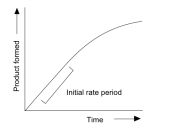Investigating the effect of temperature on the action of a protease enzyme on exposed developed film
Plan
Aim: The aim of the experiment is to find out what effect temperature has on the action of a protease enzyme on exposed developed film.
Enzymes are biological catalysts. They are made in livings things built up by amino acids to make protein. Enzymes are able to speed up reactions and can repeat reactions.
There are various factors that affect the activity of enzymes they are:
"Y Temperature
"Y pH
"Y Specificity
"Y Concentration of enzyme or substrate
Enzymes are specific, this means that they only work on one substrate molecule. A substrate molecule is what the enzyme actually works on.
The factors I have chosen to investigate are temperature. This therefore means that the temperature will be the independent variable.
In the experiment there will be a transparent plastic backing of developed film, which will have a black gelatine coat on it.
The gelatine coat is protein, which is the substrate molecule. I will put the film into protease solution, which is the enzyme. By having the gelatine coat I am able to see what happens to the gelatine coat when the temperature increases. I can find out if temperature affects the action of a protease enzyme.
Prediction:
Enzymes have an optimum temperature, which is generally below 400C. The optimum temperature is when enzymes works best and fastest at. When the temperature rises the rate increases. This is because the substrate and enzyme molecules are moving faster because the temperature has increased. This means that the molecules have more energy. They therefore are likely to collide more often with each other and a reaction will take place. However if the temperature goes over the optimum temperature the reaction slows down and the...


